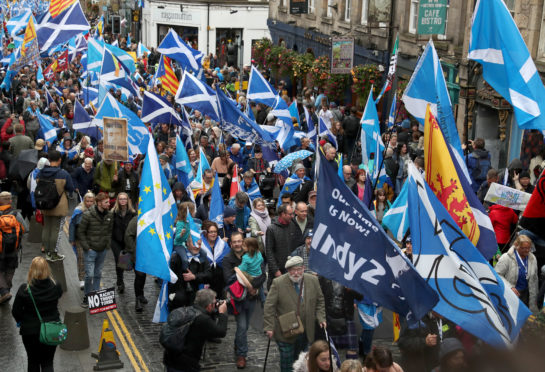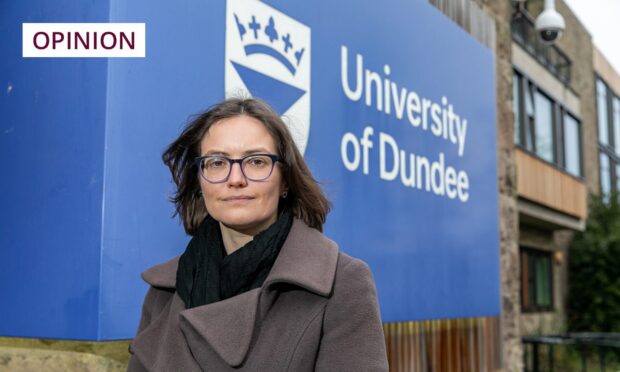Sir, – I am irritated by continuing reference in the media that the UK has “ruled out” granting Section 30.
No UK political figure of any significant status has “ruled out” the granting of one and constant repetition of this inaccuracy in the media does not change this.
“Now is not the time” is not a “no” and neither is Jeremy Corbyn’s evasive statement “not in the early period of an Labour administration” (following McDonnell’s concession that Labour would not block one).
Boris Johnson’s latest suggestion that it was a “once in a generation” event and “I think we should stick to that” is both inaccurate and meaningless.
An evasion in fact, like all the rest.
The United Nations’ Charter is unambiguous on the inalienable right of self-determination of all peoples.
The UK is an original signatory on that document, which is ius cogens.
Clarification of that Charter in the 1960s reinforces the point “without interference”.
The Scottish Claim of Right of 1989 reinforces the sovereignty of the Scottish people and their right to choose how they are governed, and this passed through Westminster unopposed on July 4 last year.
Even the Smith Commission in its final paragraphs makes the point that the devolution settlement does not prevent Scotland moving to independence, if that is established as the majority desire of the sovereign Scottish people.
A UK Government trying to block an independence referendum for Scotland would be acting illegitimately, illegally, unconstitutionally and anti-democratically and, following recent events in law, with little chance of sustaining that position.
With the Electoral Commission presently considering the precise wording (and any other methods of undermining an inevitable referendum) and with the IFG now confirming that a referendum is a right that cannot be denied to Scotland can we get on with preparing for our battle next year?
Dave McEwan Hill.
1 Tom Nan Ragh,
Dalinlongart, Argyll.
The facts don’t support a failure
Sir, – I must challenge some of the points Robert Scott raises (“The answer remains emphatically ‘no’,” Letters, October 22).
Suggesting the 2014 vote for independence was a “complete failure” on a 55% to 45% for No is rather fanciful.
You just need to look at the 52% to 48% debacle of the Brexit vote to view another “complete failure ” for Remain – I don’t think so!
The campaign for independence remains strong. Scottish voters have voted for an SNP majority for 12-13 years, and it has remained the Scottish majority party in both Westminster and Holyrood. These are the facts.
Mr Scott suggests, with no actual proof, that the people of Scotland wish to remain in the UK. The polls show otherwise.
Quoting GERS and how badly the Scottish Government is running the economy is the usual mantra from those wishing to undermine Scotland’s success in becoming a real social democracy.
If it so bad why does the SNP keep winning elections? As to obtaining a Section 30 for a second referendum, I would hope anyone would not only see the great economic self-harm in leaving the EU, but that Brexit has exposed how insignificant Scotland, a Remain country (62%), has become in this “precious Union”.
Scotland, its MPs, its government, have been maligned, belittled and totally ignored throughout the whole sorrowful process.
Robert Scott’s “better together” no longer exists, if it ever did.
A post-Brexit independent Scotland must take its rightful place in a world of independent nations.
Dan Wood.
Charles Melvin Gdns,
Kirriemuir.
A dereliction of their duty to us
Sir, – We elect our MPs and MSPs to represent us and we expect them to take decisions in our best interests.
Based on this I am shocked our Conservative MPs in Scotland seem happy to vote for Boris Johnson’s withdrawal Bill without any call for a full economic impact assessment on what the proposals in the Bill will mean for us, their constituents.
It is bad enough for them to be taking away our rights as European citizens but to be knowingly voting to make us all potentially poorer is not what people elected them to do.
Cllr Willie Robertson.
South Street, Milnathort.
Not a mention of us down south
Sir, – I have just returned from a week’s visit to Bristol to spend time with my daughter and her family.
Whilst there I kept up to date with the Brexit negotiations.
It was interesting to see the goings-on from an English perspective.
What stood out for me was that not once was Scotland even mentioned in any of the several programmes I watched.
It was as though Scotland does not exist, or was not an important part of the equation in any way.
It reminded me that a few weeks ago the Tory hardliners who were responsible for voting in Boris Johnson had stated that losing Scotland to independence was a price worth paying as long as they got Brexit.
This attitude includes the Northern Ireland issue, with one Tory spokesman last week stating that the Northern Irish peace process was of less significance than Brexit.
I conclude that Brexit for a large majority of English people is actually a proxy vote for English independence.
Harry Key.
20 Mid Street,
Largoward.
EV concessions are a bit rich
Sir, – The Department of Transport has launched a consultation on plans to give special licence plates to cars which conform to the highest environmental standard.
Consultation? That’s a laugh.
It is expected councils will allow EVs to use bus lanes. Only the rich can afford an EV but they get a government grant of up to £3,500 and a grant of £600 for a home charging point.
Councils already give free electricity at EV charging points, and free parking.
This idea will foster further resentment among owners of petrol/diesel cars.
There are 1.2 billion vehicles in the world – 99% petrol/diesel – so “saving the planet” may take a little longer.
Clark Cross.
138 Springfield Road, Linlithgow.
Illegal drugs suit the barons
Sir, – I take issue with the points made by Mr George Dobbie of Alyth, who opposes the decriminalisation/legalisation of drugs (“Only eradication of drugs supply will do it”, Letters, October 23.
The drugs barons who profit from the status quo will be pleased by his message. His proposed “eradication of the supply” wouldn’t work, and a reduced supply would simply push street prices higher.
After nearly 40 years of Trainspotting-style drug abuse in the UK, it’s surely clear that we can’t win what Michael Moore has described as the phoney war on drugs, with its attendant, awful drug-related crime?
Not to mention the added risk the illicit drugs trade brings for of corruption of some customs officers and politicians.
Better to treat drugs like alcohol, perhaps with a state monopoly on the supply.
George Morton.
29 Hudson Road,
Rosyth.










